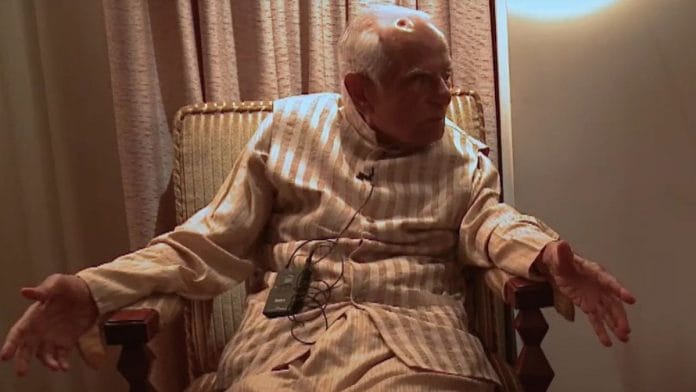Jagdish Chandra Kapur was a man consumed with the future of India. To call him ahead of his time would be a misnomer: He was a man who was thinking very much within his times, about the future of the world he inhabited.
Kapur was a social scientist, entrepreneur, and futurist. He’s been referred to as an Indian Alvin Toffler — a renowned futurist who wrote the bestselling 1970 book Future Shock, which talked about information overload and the speed at which technological advancements were changing the world. Both Kapur and Toffler were drawing peoples’ attention to societal change, almost laying the groundwork for conversations between futurists today on the way information and technology are weaponised.
Kapur and Toffler were friends. But, as one writer puts it, Kapur wasn’t as popular because “Indians are not known for their appetite for modern social philosophies, and contemporary Indian intellection is generally barren of controversial ideas.”
But even though his ideas weren’t taking hold in India, Kapur has left an impact on the world’s future — and the way we think about it.
Also Read: Meet Gagandeep Kang, Shimla scientist who’s helping save lives of thousands of Indian kids
A globalist and futurist
Born in 1920, Jagdish Chandra Kapur studied at Panjab University and the Indian Institute of Science before attending Cornell University. It was here that he became interested in fostering an open conversation between Western, developed countries and post-colonial, developing nations.
Kapur sums up several of his ideas on India and its future journey in a 1975 academic paper titled ‘India in the Year 2000’. Some of his predictions did actually come true: He wrote that unemployment and homelessness would rise, and that there would be urban overcrowding. He also predicted the increasing centralisation of political authority, and warned that “darkest clouds are appearing on India’s political horizons.”
His solution was to refocus efforts on the Nehruvian goal of industrial development, without losing sight of the Gandhian vision of village republics. He was also certain that it was impossible to predict the future of any society without “relating it to the world environment.”
The only way to do this, he wrote, was for the Indian elite to develop a new framework: One “in which the humblest in the land can, within the nearest possible future, receive their share of development and satisfy their minimum needs.”
He co-founded an NGO called the World Public Forum with Russian and Greek public thinkers like Vladimir Yakunin, who later became President of the Russian Railways. It serves as a platform for initiatives like the Dialogue of Civilizations, and the Rhodes Forum. Headquartered in Austria, the Dialogue of Civilizations aims to encourage a dialogue between civilisations and religions to promote mutual respect and understanding for different values and societies.
Kapur also founded and published the World Affairs Journal. Printed and published in India, it tries to increase the dialogue between developing and developed nations. Some of the people who have written for the journal include former Prime Minister Manmohan Singh, former Soviet President Mikhail Gorbachev, several diplomats, and the Dalai Lama.
Also Read: The importance of being George Soros – billionaire with own foreign policy
Harbinger of renewable energy in India
Jagdish Chandra Kapur also quickly recognised the promise and potential of technology in a developing country like India, with gaping economic inequalities. “Technology and energy are inseparable twin sisters,” he wrote, “India must make basic choices with regard to the use of technology and energy, deciding how maximum production may be assured with maximum employment and minimum energy use.”
Kapur wrote about solar energy as early as 1963. At a time when the mere idea and its practicality was unbelievable, Kapur wrote that it would take at least two decades for the world to see such sources of energy as commercially viable. He also wrote about how solar power reduces “ecological hazards,” showing great foresight into the polluted world of the 21st century.
He founded the Kapur Surya Foundation and the Kapur Solar Farms in India, which are both dedicated to studying and harnessing solar energy. The Foundation also publishes journals, organises conferences, and is involved in philanthropic work.
The government of India awarded him the Padma Bhushan in 2010, for his services in the field of science and technology.
Also Read: Disha Ravi — ‘Soft-spoken girl with German Shepherd who always talked of making world better’
Faded into the future
A review of his book India: An Uncommitted Society, brands him a “scientific soothsayer.” It points out that his ideas were popular in developing countries in Africa and Latin America, but weren’t as yet popular in India. By addressing his book to the Indian elite, Kapur was trying to change the very culture that rendered him too modern in India.
Chinese philosopher Tu Weiming, a founding Director of the Institute for Advanced Humanistic Studies in Peking, said Kapur “was a towering figure in reconfiguring the new world order, a major public intellectual in Asia, and a source of inspiration for us.”
For a man obsessed with the future, he might not have much of an imprint on the internet — but his legacy is inscribed in the future he envisioned for India. He predicted that the key to India’s future is in its scientific and technological potential, and the ability to unlock it depended on global dialogue.
“My purpose is to dialogue, and this is what we’re trying to do,” Jagdish Chandra Kapur said in a conversation before his death in 2010. “Culture and consumerism. Without the transformation of culture, nothing else will change.”
(Edited by Srinjoy Dey)






